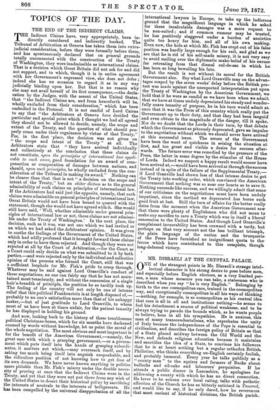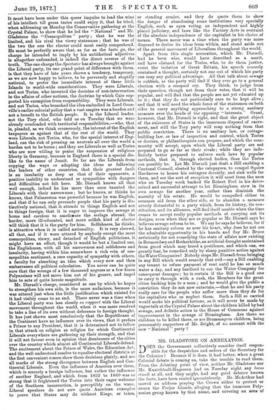MR. DISRAELI AT THE CRYSTAL PALACE.
ONE of the strangest points in Mr. Disraeli's strange intel- lectual character is his strong desire to pose before men, and especially before English electors, as a very limited per- son, a man whose measure you can take, a statesman who isr described when you say "he is very English." Belonging by birth to the one cosmopolitan race, trained in the cosmopolitan way, and exceptionally cosmopolitan in all his ways of thinking —nothing, for example, is so cosmopolitan as his central idea. that race is all in all and institutions nothing—he seems to feel his detachment a source of political weakness, and to be always trying to parade the bounds which, as he wants people to believe, hem in all his sympathies. He is anxious, this man of many transeendentalisms, who reprobates the unity of Italy because the independence of the Pope is essential to civilisation, and describes the foreign policy of Britain as that of a State placed midway between the Old World and the New, and defends religious education because it maintains and sanctifies the idea of a State, to convince his followers, that he is at heart nothing but a regular orthodox British Philistine, who thinks everything un-English certainly foolish, and probably immoral. Every year he talks publicly as a "county man" to the squires and farmers of Bucks about bullocks and oil-cake and labourers' perquisites. If he attends a public dinner in Lancashire, he apologises for addressing a county with which he has no direct connection. He loves to be solemn over local rating, talks with pathetic affection of the Church he has so bitterly satirised in Tancred, and would like to say, if he only dared, how he reverences that most ancient of historical divisions, the British parish.. It must have been under this queer impulse to load the wine of his intellect till gross tastes could enjoy it, that he tried, when addressing on Monday the Conservative gathering at the Crystal Palace, to show that he led the " National" and Mr. Gladstone the "Cosmopolitan" party ; that he was the limited, and his rival the viewy statesman ; that he was of the two the one the elector could most easily comprehend. He must be perfectly aware that, as far as the facts go, the charge he intended to imply by his antithetical adjectives is altogether unfounded, is indee.a the direct reverse of the truth. The one charge the Spectator has always brought against the Liberal party, its one grand point of difference with them, is that they have of late years shown a tendency, temporary, as we are now happy to believe, to be perversely and stupidly national, to prefer the immediate interest of these little Islands to world-wide considerations. They were Liberals, and not Tories, who invented the doctrine of non-intervention in the affairs of other nations, the doctrine by which Cain sup- ported his exemption from responsibility. They were Liberals, and not Tories, who broached the idea embodied in Lord (Iran- 'villa's earlier colonial policy that a vast empire was a burden and not a benefit to the British people. It is the Liberal leader, not the Tory chief, who told us on Tuesday that we were already overloaded with territorial responsibilities,—who, that is, pleaded, as we think erroneously, the interest of the English taxpayers as against that of the rest of the world. They were Liberals, not Tories, who, for the special interest of Eng- land, ran the risk of pressing on neutrals all over the world a burden not to be borne ; and they are Liberals as well as Tories who are now willing to praise the suspension of religious liberty in Germany, because in England there is a special dis- like to the name of Jesuit. So far are the Liberals from copying the ways or adopting the ideas or following the leaders of other countries, that their greatest fault is an insularity as deep as that of their opponents, a positive inability to understand or sympathise with dangers and difficulties not felt here. Mr. Disraeli knows all that well enough, indeed he has more than once taunted the Liberals with their narrowness ; but he knows, or thinks he knows, that Palmerston was powerful because he was English, and that if he can only persuade people that his party is dis- tinctively national, that it attends to things English and not to things foreign, that it is eager to improve the sewage at home and careless to ameliorate the serfage abroad, the harder, more ill-educated, and more selfish kind of elector will think that it is the party for him. Selfishness, he thinks, is attractive when it is called nationality. It is very shrewd, all that, and if it were uttered by anybody except the most
cosmopolitan, viewy, and detached of English politicians, it might have an effect, though it would be but a limited one, the Englishman, with all his narrowness and selfishness and
insularity, having within him somewhere a rich vein of cos- mopolitan sentiment, a rare capacity of sympathy with others, a faculty for absorbing an idea which every now and then embarrasses all political calculation. You never can be quite sure that the wrongs of a few thousand negroes or a few dozen Polynesians will not move him out of his groove, and impel him to acts of quite heroic magnitude.
Mr. Disraeli's charge, considered as one by which he hopes to strengthen his own side, is the more audacious, because it was uttered just when the little justification which existed for
it had visibly come to an end. There never was a time when the Liberal party was less closely en rapport with the Liberal
movement throughout the world, when it was more resolved to take a line of its own without deference to foreign thought. It has just shown most conclusively that the Republicans of the Continent have no influence over its views, that it prefers a Prince to any President, that it is determined not to follow in that attack on religion as religion for which Continental Liberals everywhere are gathering up their strength, and that it will not favour even in opinion that dominance of the cities over the country which almost all Continental Liberals defend. The excitement about the Prince of Wales, the Education Act, and the well understood resolve to equalise electoral districts at the first convenient season show those decisions plainly, and are all marks of the strong divergence between English and Con- tinental Liberals. Even the influence of America over them, which is scarcely a foreign influence, but rather the influence of another England, and which from 1832 to 1860 was so strong that it frightened the Tories into their eager welcome of the Southern insurrection, is perceptibly on the wane. Liberal speakers do not now quote American examples to prove that States may do without Kings, or taxes, or standing armies, and they do quote them to show the danger of abandoning some institutions very specially English, such as open voting, an independent and highly placed judiciary, and laws like the Factory Acts in restraint of the absolute independence of the capitalist in his choice of means. There never was a time when the party was more disposed to derive its ideas from within, and stand aside out of the general movement of Liberalism throughout the world. Apart from this single accusation, which Mr. Disraeli, had he been wise, would have described as a merit, and have claimed for the Tories, who, to do them justice, resist the isolation of Great Britain, his speech scarcely contained a thought, certainly not one out of which his party can reap any political advantage. All that talk about sewage is rubbish, as the party will find if they ever go to a general election with a cesspool cry. They think, to judge from their speeches, though not from their votes, that it will be popular, and will find that the people are not yet educated up to it ; that they do not particularly care to be kept alive ; and that it will need the whole force of the statesmen on both sides to carry anything approaching to a strong sanitary measure over the heads of the opposing "interests." Grant, however, that Mr. Disraeli is right, and that the great object of the existence of States is the innocuous disposal of excre- ment, and still the Tory party will reap nothing from that public conviction. There is no sanitary law, or cottage- building law, or law of inspection and control, which Tories or doctors, or philanthropists can propose, and which the com- munity will accept, upon which the Liberal party are not prepared to go as far as their rivals ; while they are inde- finitely better prepared to enforce such laws by popular methods, that is, through elected bodies, than the Tories can possibly be. Let Mr. Disraeli just draft a Bill enabling a Cantonal Council, elected by the ratepayers, to compel Squire Hardacres to house his cottagers decently, and sink wells for them, and see the sort of reception it will meet from the men who on Tuesday week backed Sir Robert Peel in his deter- mined and successful attempt to let Birmingham stew in its own sewage for another year, rather than diminish the amenity of his estate. He would be compelled either to summon aid from the other side, or to abandon a measure utterly distasteful to a party which, from its history, its con- stitution, and its alliances, will find itself unable when the time comes to accept really popular methods of carrying out its designs, even when they are as popular as Mr. Disraeli says he believes sewage reform to be. We say he says he believes, for if he has sanitary reform so near his heart, why does he not use the admirable opportunity in his hands, and flay Mr. Bruce artistically for not remedying the state of affairs now existing in Bermondsey and Rotherhithe, an artificial drought maintained
from greed which may breed a pestilence, and which can, we greatly fear, be remedied only by sharp punitive action against the Water Companies? Nobody stops Mr. Disraeli from bringing in any Bill which would remedy that evil—say a Bill enabling any tenant to refuse payment of rent until he has so much water a day, and any landlord to sue the Water Company for consequent damages ; he is certain if the Bill is a good one to carry it through with a rush, the Members for the great cities backing him to a man ; and he would give the public a conviction they do not now entertain,—that he and his party really care for the people who suffer more than they do for the capitalists who so neglect them. Such a Bill so carried would make his political fortune, as it will never be made by vague talk at the Crystal Palace about the children killed by bad sewage, and definite action in the House of Commons against improvement in the sewage of Birmingham. Are there no children to be killed there, or are Brummagem children, being presumably supporters of Mr. Bright, of no account with the new "National" party ?



































 Previous page
Previous page